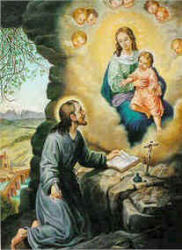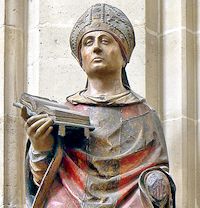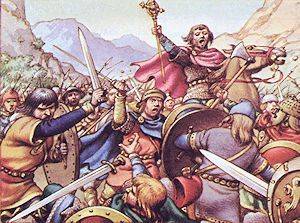Ordinary Time: July 31st
Memorial of St. Ignatius of Loyola, priest
Other Commemorations: St. Germanus, Bishop (RM)
» Enjoy our Liturgical Seasons series of e-books!
In the year 1521 a cannon ball fractured the left leg of Captain Ignatius Loyola, the future founder of the Jesuits. While he was convalescing, Ignatius read about Christ and His saints and thus turned wholly to God. He then undertook to equip himself for Christ's service by acquiring a good classical and theological education. The members of the Society of Jesus became the shock troops of the Church in the battle against the spread of Protestantism in Europe, as well as one of the greatest foreign mission organizations that the world has known. Ignatius died on July 31, 1556.
See Catholic Culture's special section on St. Ignatius.
St. Ignatius
Ignatius, by nation a Spaniard, was born of a noble family at Loyola, in Cantabria. At first he attended the court of the Catholic king, and later on embraced a military career. Having been wounded at the siege of Pampeluna, he chanced in his illness to read some pious books, which kindled in his soul a wonderful eagerness to follow in the footsteps of Christ and the saints. He went to Montserrat, and hung up his arms before the altar of the Blessed Virgin; he then watched the whole night in prayer, and thus entered upon his knighthood in the army of Christ. Next he retired to Manresa, dressed as he was in sackcloth, for he had a short time before given his costly garments to a beggar. Here he stayed for a year, and during that time he lived on bread and water, given to him in alms; he fasted every day except Sunday, subdued his flesh with a sharp chain and a hair-shirt, slept on the ground, and scourged himself with iron disciplines. God favored and refreshed him with such wonderful spiritual lights, that afterwards he was wont to say that even if the Sacred Scriptures did not exist, he would be ready to die for the faith, on account of those revelations alone which the Lord had made to him at Manresa. It was at this time that he, a man without education, composed that admirable book of the Spiritual Exercises.
 However, in order to make himself more fit for gaining souls, he determined to procure the advantages of education, and began by studying grammar among children. Meanwhile he relaxed nothing of his zeal for the salvation of others, and it is marvelous what sufferings and insults he patiently endured in every place, undergoing the hardest trials, even imprisonment and beatings almost to death. But he ever desired to suffer far more for the glory of his Lord. At Paris he was joined by nine companions from that University, men of different nations, who had taken their degrees in Arts and Theology; and there at Montmartre he laid the first foundations of the order, which he was later on to institute at Rome. He added to the three usual vows a fourth concerning missions, thus binding it closely to the Apostolic See. Paul III first welcomed and approved the Society, as did later other Pontiffs and the Council of Trent. Ignatius sent St. Francis Xavier to preach the Gospel in the Indies, and dispersed others of his children to spread the Christian faith in other parts of the world, thus declaring war against paganism, superstition, and heresy. This war he carried on with such success that it has always been the universal opinion, confirmed by the word of pontiffs, that God raised up Ignatius and the Society founded by him to oppose Luther and the heretics of his time, as formerly he had raised up other holy men to oppose other heretics.
However, in order to make himself more fit for gaining souls, he determined to procure the advantages of education, and began by studying grammar among children. Meanwhile he relaxed nothing of his zeal for the salvation of others, and it is marvelous what sufferings and insults he patiently endured in every place, undergoing the hardest trials, even imprisonment and beatings almost to death. But he ever desired to suffer far more for the glory of his Lord. At Paris he was joined by nine companions from that University, men of different nations, who had taken their degrees in Arts and Theology; and there at Montmartre he laid the first foundations of the order, which he was later on to institute at Rome. He added to the three usual vows a fourth concerning missions, thus binding it closely to the Apostolic See. Paul III first welcomed and approved the Society, as did later other Pontiffs and the Council of Trent. Ignatius sent St. Francis Xavier to preach the Gospel in the Indies, and dispersed others of his children to spread the Christian faith in other parts of the world, thus declaring war against paganism, superstition, and heresy. This war he carried on with such success that it has always been the universal opinion, confirmed by the word of pontiffs, that God raised up Ignatius and the Society founded by him to oppose Luther and the heretics of his time, as formerly he had raised up other holy men to oppose other heretics.
 He made the restoration of piety among Catholics his first care. He increased the beauty of the sacred buildings, the giving of catechetical instructions, the frequency of sermons and of the sacraments. He everywhere opened schools for the education of youth in piety and letters. He founded at Rome the German College, refuges for women of evil life, and for young girls who were in danger, houses for orphans and catechumens of both sexes, and many other pious works. He devoted himself unweariedly to gaining souls to God. Once he was heard saying that if he were given his choice he would rather live uncertain of attaining the Beatific Vision, and in the meanwhile devote himself to the service of God and the salvation of his neighbor, than die at once certain of eternal glory. His power over the demons was wonderful. St. Philip Neri and others saw his countenance shining with heavenly light. At length in the sixty-fifth year of his age he passed to the embrace of his Lord, whose greater glory he had ever preached and ever sought in all things. He was celebrated for miracles and for his great services to the Church, and Gregory XV enrolled him amongst the saints; while Pius XI, in response to the prayers of the episcopate, declared him heavenly patron of all Spiritual Exercises.
He made the restoration of piety among Catholics his first care. He increased the beauty of the sacred buildings, the giving of catechetical instructions, the frequency of sermons and of the sacraments. He everywhere opened schools for the education of youth in piety and letters. He founded at Rome the German College, refuges for women of evil life, and for young girls who were in danger, houses for orphans and catechumens of both sexes, and many other pious works. He devoted himself unweariedly to gaining souls to God. Once he was heard saying that if he were given his choice he would rather live uncertain of attaining the Beatific Vision, and in the meanwhile devote himself to the service of God and the salvation of his neighbor, than die at once certain of eternal glory. His power over the demons was wonderful. St. Philip Neri and others saw his countenance shining with heavenly light. At length in the sixty-fifth year of his age he passed to the embrace of his Lord, whose greater glory he had ever preached and ever sought in all things. He was celebrated for miracles and for his great services to the Church, and Gregory XV enrolled him amongst the saints; while Pius XI, in response to the prayers of the episcopate, declared him heavenly patron of all Spiritual Exercises.
—Excerpted from The Liturgical Year, Abbot Gueranger O.S.B.
Patronage: Jesuits; Jesuit Order; Society of Jesus; Spiritual Exercises; military ordinariate of the Philippines; retreats; soldiers; World Youth Day 2011; archdiocese of Baltimore, Maryland; Basque country: Spain: Álava; Azpeitia; diocese of Bilbao; Bizkaia; Gipuzkoa; Guipuscoa; Guipúzcoa; Vizcaya
Symbols and Representation: Book; chasuble; Holy Communion; a rayed IHC or IHS; heart with crown of thorns; sword and lance upon an altar; book with words Ad Maiorem Dei Gloriam; apparition of our Lord
Highlights and Things to Do:
- Learn more about St. Ignatius and the Jesuit Order and/or read this biography by John Farrow, St. Ignatius of Loyola.
- Learn more about St. Ignatius:
- Celebrate the Feast of St. Ignatius
- If you have never done so, consider making St. Ignatius' Spiritual Exercises. You can find it online here or you may purchase a copy.
- The Jesuits at Georgetown have a collection of St. Ignatius' Letters and Instructions to his fellow Jesuits. Much of his spiritual teaching is found in his letters and is considered an important source of Jesuit spirituality. If you are interested in reading them click here.
- St. Ignatius founded his Society to give the greatest possible service to the Church and to the Pope. In addition to vows of poverty, chastity and obedience, Jesuits take a special vow of loyalty to the Pope. Today would be a good time to say a prayer for Pope Francis.
- In the Spiritual Exercise, St. Ignatius strongly recommends making a daily examination of conscience. If this is not part of your schedule today would be a good time to start.
- See the statues of St. Ignatius: on St. Peter's Basilica Colonnade and his founder's statue in St. Peter's Basilica.
- Visit Catholic Cuisine for some feast food ideas.
St. Germanus
 In his youth Germanus gave little sign of sanctity. He was of noble birth, and at first practiced the law at Rome. After a time the emperor placed him high in the army. But his one passion was the chase. He was so carried away as even to retain in his sports the superstitions of the pagan huntsmen. Yet it was revealed to the Bishop of Auxerre that Germanus would be his successor, and he gave him the tonsure almost by main force. Forthwith Germanus became another man, and making ever his lands to the Church, adopted a life of humble penance.
In his youth Germanus gave little sign of sanctity. He was of noble birth, and at first practiced the law at Rome. After a time the emperor placed him high in the army. But his one passion was the chase. He was so carried away as even to retain in his sports the superstitions of the pagan huntsmen. Yet it was revealed to the Bishop of Auxerre that Germanus would be his successor, and he gave him the tonsure almost by main force. Forthwith Germanus became another man, and making ever his lands to the Church, adopted a life of humble penance.
At that time the Pelagian heresy was laying waste England, and Germanus was chosen by the reigning Pontiff to rescue the Britons from the snare of Satan. With St. Lupus he preached in the fields and highways throughout the land. At last, near Verulam, he met the heretics face to face, and overcame them utterly with the Catholic and Roman faith. He ascribed this triumph to the intercession of St. Alban, and offered public thanks at his shrine. Towards the end of his stay, his old skill in arms won over the Picts and Scots the complete but bloodless "Alleluia" victory, so called because the newly-baptized Britons, led by the Saint, routed the enemy with the Paschal cry. Germanus visited England a second time with St. Severus.
He died in 448, while interceding with the emperor for the people of Brittany.
—Excerpted from Lives of the Saints, by Alban Butler, Benziger Bros. ed. [1894]
The Ruin and Conquest of Britain (excerpt)
 By now the savage host of the enemy was close at hand and Germanus rapidly circulated an order that all should repeat in unison the call he would give as a battle-cry. Then, while the enemy were still secure in their belief that their approach was unexpected, the bishops three times chanted the Alleluia. All, as one man, repeated it and the shout they raised rang through the air and echoed many times in the confined space between the mountains. The enemy were panic-stricken, thinking that the surrounding rocks and the very sky itself were falling on them. Such was their terror that no effort of their feet seemed enough to save them. They fled in every direction, throwing away their weapons and thankful if they could at least save their skins. Many threw themselves into a river which they had just crossed with ease, and were drowned in it. Thus the British army looked on at its revenge without striking a blow, idle spectators of the victory they achieved. The booty strewn everywhere was collected; the pious soldiery obtained the spoils of a victory from heaven. The bishops were elated at the rout of the enemy without bloodshed and a victory gained by faith and not by force.
By now the savage host of the enemy was close at hand and Germanus rapidly circulated an order that all should repeat in unison the call he would give as a battle-cry. Then, while the enemy were still secure in their belief that their approach was unexpected, the bishops three times chanted the Alleluia. All, as one man, repeated it and the shout they raised rang through the air and echoed many times in the confined space between the mountains. The enemy were panic-stricken, thinking that the surrounding rocks and the very sky itself were falling on them. Such was their terror that no effort of their feet seemed enough to save them. They fled in every direction, throwing away their weapons and thankful if they could at least save their skins. Many threw themselves into a river which they had just crossed with ease, and were drowned in it. Thus the British army looked on at its revenge without striking a blow, idle spectators of the victory they achieved. The booty strewn everywhere was collected; the pious soldiery obtained the spoils of a victory from heaven. The bishops were elated at the rout of the enemy without bloodshed and a victory gained by faith and not by force.
Symbols and Representation: bishop carrying a knife; bishop trampling on a judge
Patronage: Auxerre, France; San Germano Vercellese, Italy
Highlights and Things to Do:
- Read more of The Ruin and Conquest of Britain here.
- Read more about Pelagianism. See also the Catholic Encyclopedia.
- Learn more about St. Germanus:






